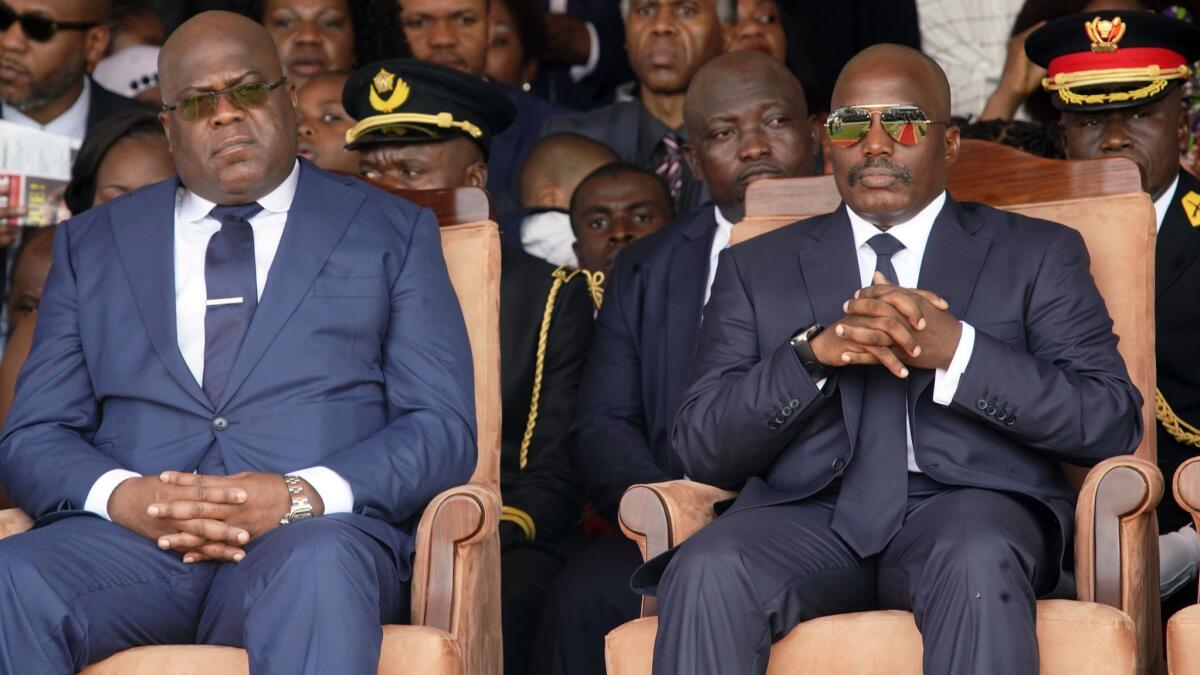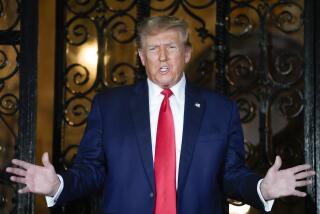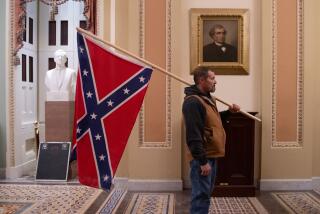Op-Ed: Russ Feingold: Trump needs to take action on Congo’s election crisis, not exacerbate it

The Democratic Republic of the Congo was within reach of what would have been its first democratic and peaceful transition of presidential power since 1960. Unfortunately, after the flawed handling of the country’s December election, this long-sought goal has eluded the Congolese people once again.
In what may appear a positive turn of events, an opposition leader, Felix Tshisekedi, was named the winner of the country’s recent election and sworn in as president. According to the official line, Tshisekedi supposedly defeated Emmanuel Ramazani Shadary, the hand-picked successor of outgoing President Joseph Kabila.
But Tshisekedi most likely did not get the most votes. Most experts believe that a different opposition leader, Martin Fayulu, received upward of 60%. It appears that Tshisekdi, who is the son of a legendary opposition leader, made a deal with Kabila’s regime to pretend that he won the election.
The Kabila regime may not have installed its preferred choice. But the notion that it can simply pick a different candidate is completely unacceptable. Among other things, it means the supposed winner, Tshisekedi, is completely beholden to Kabila and his cronies.
The current moment provides an opportunity to make it plain that the U.S. is not interested in picking up the old playbook.
This charade constitutes yet another tragedy for Congo, the scene of unspeakable tragedies for nearly 150 years. It is almost certain to lead to increased instability within the country and throughout much of Africa.
The United States has a special responsibility to ensure that a legitimate presidential succession takes place in Congo. Sadly, we are falling short.
Beginning in 1960, the U.S. played a key role in repeatedly undoing the will of the Congolese people. After a truly free and fair election that year, the U.S. was complicit in, if not primarily responsible for, the brutal assassination of the winner of that election, Patrice Lumumba.
The U.S. then supported an inexperienced military officer, Joseph Mobutu, as he executed a coup and became absolute ruler using increasingly violent tactics. Washington did not abandon this dictator until after the fall of the Soviet Union.
After decades of war and no peaceful transitions of power, hopes were high that Congo would finally hold a legitimate election in December. It soon became clear that the long-delayed election was not a model exercise.
Kabila and his allies first altered the country’s election laws to allow a candidate who wins a mere plurality of votes to become president. This precluded the possibility of a runoff between the top two contenders, in a country that has a plethora of political parties.
Then the regime chose Shadary, a relatively unknown Kabila loyalist, as successor, evidently on the presumption that, one way or another, he could win a plurality in a multi-candidate election. The government also excluded from the ballot two other candidates who had broad national appeal.
Nonetheless, an election was finally held. When the early vote counts started coming in, even the Kabila regime couldn’t pretend that Shadary had done better than third place. The Roman Catholic Church, with its extensive efforts to monitor the election, came to the same conclusion, as did all the exit polls.
The people had clearly chosen a new leader from a non-ruling party in a relatively peaceful election. But, after dithering for a few days, the government declared Tshishikedi, the apparent second-place finisher, as winner.
The U.S. had been pushing for fair elections in Congo for many years. In early January, the State Department issued a statement calling for the will of the voters to be respected and warning that those who undermine the democratic process “may find themselves not welcome in the United States and cut off from the U.S. financial system.”
Then, in a strange reversal, the State Department issued a different statement a few weeks later, delivering the exact opposite message from the one that Congolese voters desperately need. It welcomed the certification of Tshishikedi and lamely “encouraged” him to address reported election irregularities.
Enter the Fray: First takes on the news of the minute »
This is a terrible wrong turn. The U.S. should have made concerted efforts to resolve Congo’s election crisis. At a minimum, Congress should urge the Trump administration, as Rep. Chris Smith (R-N.J.) recently suggested, “to apply visa denials, sanctions and other tools against those complicit in election fraud.”
The history of the U.S. in Congo is a powerful reminder of just how wrong things go when Africa is treated as a venue for great power competition where political legitimacy is irrelevant, a discredited idea that the Trump administration seems puzzlingly eager to revisit.
The current moment provides an opportunity to make it plain that the U.S. is not interested in picking up the old playbook. Control of Congo’s future belongs in the hands of the Congolese people — not with favored elites, not with external powers, not even with the African leaders now offering their congratulations to Tshishekedi.
Rarely has the will of the Congolese people been expressed so clearly. Whether the mechanism is a recount, or an admission from the Congolese electoral commission that it reported the wrong results, the U.S. must use its influence not to dictate outcomes, but to insist on the outcome that the voters already chose.
Russ Feingold was special envoy to the Great Lakes Region of Africa from July 2013 to March 2015. He was previously chairman of the U.S. Senate Subcommittee on African Affairs.
Follow the Opinion section on Twitter @latimesopinion or Facebook.
More to Read
A cure for the common opinion
Get thought-provoking perspectives with our weekly newsletter.
You may occasionally receive promotional content from the Los Angeles Times.






